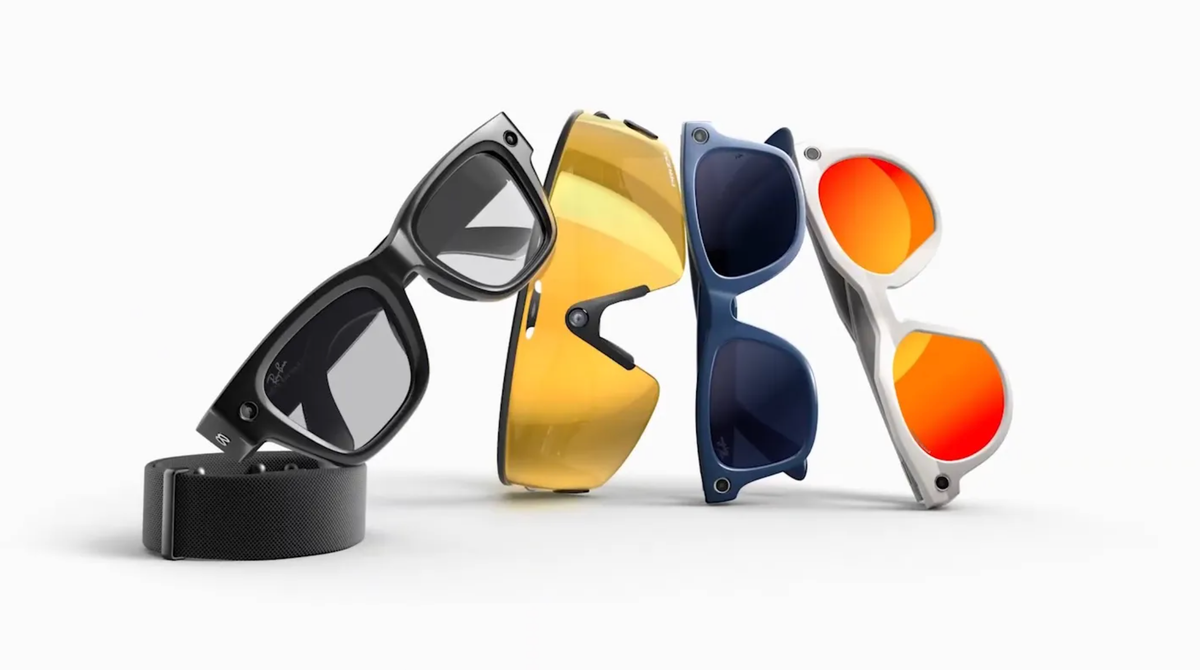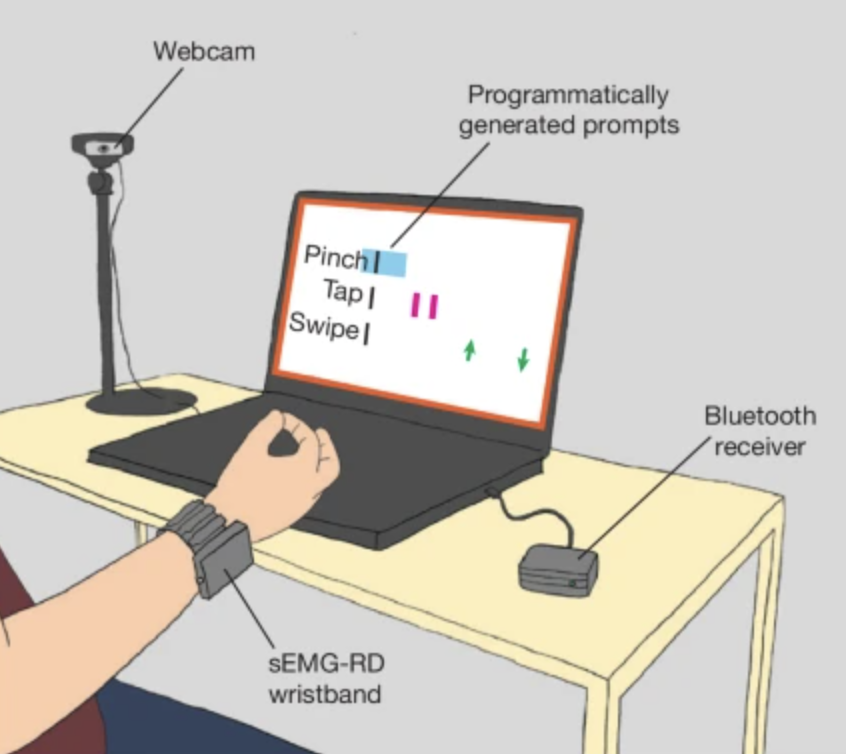Meta Reframes Their Reality

Live tech demos are a bitch. It was true 15 years ago when Steve Jobs famously couldn't get his brand new iPhone 4 to load a website on stage, and it was true yesterday, when Mark Zuckerberg couldn't accept a video call sent to his smart glasses. And his wasn't the only demo that wouldn't work for the same reason. We've solved a lot of new and interesting technological challenges over that time frame but we haven't fixed the physics of WiFi signal interference, sadly.1
And it's too bad because it clearly distracted from the unveiling of Meta's new 'Ray-Ban Display' glasses, their first foray into a wearable with a screen and a brand-new method of input – both of which sound cool, but the demo glitches made it hard to see just how cool they are. The good news is that the moment should be lost in time because Meta is releasing these in just a couple of weeks.
So if we can look past that part of the keynote – and I wrote up some thoughts about the general play ahead of time because everything leaked, as well as early thoughts on the 'Neural Band' which I knew a thing or two about as an investor in the company Meta bought – I think the most interesting element was the way Zuck framed the event. Because it was clearly an attempt to reframe the company.
As you may recall, this is a company that was once called Facebook. But now that's just one of many apps in their arsenal. The company shifted to 'Meta' after they bought Oculus and clearly believed that VR would be the future of computing.2 As it turns out, such thinking may have been premature. In fact, it's still not clear that VR will ever fully mature – at least not to the point that Zuck and company were thinking about four years ago. While it wasn't that long ago, a lot has changed since then. Namely, AI.
Zuckerberg has spoken before about his mistake in believing that VR (and AR) would beat AI to market, at least in terms of mainstream usage. When ChatGPT launched and made the opposite true, it created an awkward situation for Meta, certainly in name – literally. And so that's why you heard Zuck kick off Connect today with the statement:
"Our goal is to build great looking glasses that deliver personal superintelligence and a feeling of presence using realistic holograms. And these ideas combined are what we call the Metaverse."
To spell out the key elements there:
- Glasses
- Superintelligence
- Presence
- Metaverse
To take it a step further:
- While others have done glasses, the focus is great looking glasses
- While others talk superintelligence, we focus on the personal variety
- Presence has been tried, but it needs to feel real which we do with holograms3
- All of this makes up our definition of the Metaverse
This statement is Zuck saying that he actually wasn't wrong to rename the company Meta, because they can reframe what "Meta" means by taking everything else they're doing and backing into it. It's a stretch, but fine.
He went on to talk up the notion that glasses are the ideal form-factor for AI. This also feels a bit backed into because it's the one form factor where Meta has had some success and most importantly, that isn't a phone. Talking up the idea of technology aiding us but then getting out of the way, "I think that we lost it a little bit with phones. And we have the opportunity to get it back with glasses."
Zuckerberg is hardly the only one with such talking points. And that includes people who have been instrumental in creating our current world of smartphones. But Zuck probably has the most to lose if they can't break this stranglehold that Apple (and to a lesser extent, Google) has on the world. And that's why he keeps searching for what's next. VR. AR. AI.
But again, there needs to be a device on which these things run. Right now, it's still the phone. But Zuck needs it to not be the phone. And so it's glasses in his eyes. The obvious concern would be that this isn't necessarily because it will be glasses, but instead because glasses is where Meta is seeing success at the moment. Again, we're backing into things...
That doesn't mean he'll be wrong. I, for one, as someone who wears glasses full time, hope he's right! But I'm not yet convinced that he is. My bet would be that glasses play a part in the future of computing, but perhaps not the main role. That will likely continue to be played by the smartphone for the foreseeable future. When pressed, everyone, including undoubtedly Zuck, will admit that. But it's just an impossible vision to have to sell when you don't control a smartphone platform.
Still, nothing changes eventually if you don't try to change things. So Meta deserves a lot of credit for continuing to push here – and in VR too with the Quest, and the Horizons platform elements Zuck talked up at the end of his portion of the keynote. Meta has gone far beyond the point where other companies would have thrown in the towel. Even if they were true believers, Wall Street would have made them. And that's where founder control can buy what money literally can't. No other public company would be allowed to make such bets for so long. To spend upwards of $100B on projects that generate very little revenue, let alone profit.
And that was before AI entered the picture and jacked that spend up by at least a few times if not an order of magnitude when it's all said and done. "This is going to be the most important technology of our lifetimes," Zuckerberg said very clearly on stage about AI (fine, I guess technically about "superintelligence") – just in case all of his other moves the past many months haven't made that abundantly clear.
But unlike with VR, Meta is not operating in a relative vacuum in AI. Not only is there competition, there are rivals that look far ahead at the moment. And that's where and why "Personal Superintelligence" has come into the picture. "AI should serve people. Not just be something that sits in a data center automating large parts of society," Zuck noted in a shot at OpenAI and probably Google and anyone else working in the space.
Those folks don't (yet) have the new form factor for AI. Which again, gives the feeling as to why Meta is so quick to double and triple down on glasses here. Google is coming. Apple is coming. Amazon is coming. OpenAI is coming – with something. But Meta is here. Shipping what looks to be an impressive product at an impressive price point.
But all of that doesn't ensure that it will be enough to create a successful product. It still might be too early. It probably is. Beyond just the technical limitations, there are new norms that still need to be established for people wearing around glasses with cameras. The Ray-Ban Metas were a first step (well, technically Snap's Spectacles were perhaps the first step), and this would seem to be step two. But no one yet knows how many steps will actually be needed here. If it's three, that's great for Meta. If it's ten, maybe less so.
And all of that is especially true when Google Glass was a big step back a decade ago. Is the world now ready for always-on, recording glasses? Zuckerberg notes how useful such capabilities are when meeting with people and not needing to take explicit notes for follow-up items. But how much of that is a regular person problem versus a Mark Zuckerberg problem?
Another odd thing not to mention in this keynote: the Orion demo. Just a year ago, this was Zuck's early glimpse into the future. But that was mainly AR. And now it's all about AI. So are we retconning that project or, more likely, will it also just be roped into this new vision for the meta Meta?
The future was virtual reality. Then augmented reality. Now artificial intelligence.
And so there I am again, wondering how much of this entire thing, from the new mission statement on down, was backed into. That doesn't mean it won't work, it just makes the path to success less obvious. What if there's another new hot thing in a few years? Will the focus shift again? With Meta, from the name on down, you always have to wonder...



1 I was there in the audience at WWDC 2010 when Steve Jobs told everyone to turn off their WiFi. It got quite the laugh. He wasn't kidding. It was quite the surreal moment. He was pissed. ↩
2 They perhaps had some other reasons to try to change the narrative around the company, which people tend to forget now. So it may have worked! ↩
3 Sort of strange that this was the one element of his equation that they didn't talk about at all yesterday. Though he almost hinted at it with his "there is no 8-bit Eiffel Tower here" quip during the Horizons portion (which was worth a legit laugh). ↩



